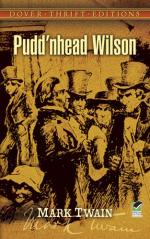“Do you mean that you would be sold into slavery to save me?”
“Ain’t you my chile? En does you know anything dat a mother won’t do for her chile? Day ain’t nothin’ a white mother won’t do for her chile. Who made ’em so? De Lord done it. En who made de niggers? De Lord made ’em. In de inside, mothers is all de same. De good lord he made ’em so. I’s gwine to be sole into slavery, en in a year you’s gwine to buy yo’ ole mammy free ag’in. I’ll show you how. Dat’s de plan.”
Tom’s hopes began to rise, and his spirits along with them. He said:
“It’s lovely of you, Mammy—it’s just—”
“Say it ag’in! En keep on sayin’ it! It’s all de pay a body kin want in dis worl’, en it’s mo’ den enough. Laws bless you, honey, when I’s slav’ aroun’, en dey ‘buses me, if I knows you’s a-sayin’ dat, ’way off yonder somers, it’ll heal up all de sore places, en I kin stan’ ’em.”
“I DO say it again, Mammy, and I’ll keep on saying it, too. But how am I going to sell you? You’re free, you know.”
“Much diff’rence dat make! White folks ain’t partic’lar. De law kin sell me now if dey tell me to leave de state in six months en I don’t go. You draw up a paper—bill o’ sale—en put it ’way off yonder, down in de middle o’ Kaintuck somers, en sign some names to it, en say you’ll sell me cheap ’ca’se you’s hard up; you’ll find you ain’t gwine to have no trouble. You take me up de country a piece, en sell me on a farm; dem people ain’t gwine to ask no questions if I’s a bargain.”
Tom forged a bill of sale and sold his mother to an Arkansas cotton planter for a trifle over six hundred dollars. He did not want to commit this treachery, but luck threw the man in his way, and this saved him the necessity of going up-country to hunt up a purchaser, with the added risk of having to answer a lot of questions, whereas this planter was so pleased with Roxy that he asked next to none at all. Besides, the planter insisted that Roxy wouldn’t know where she was, at first, and that by the time she found out she would already have been contented.
So Tom argued with himself that it was an immense advantaged for Roxy to have a master who was pleased with her, as this planter manifestly was. In almost no time his flowing reasonings carried him to the point of even half believing he was doing Roxy a splendid surreptitious service in selling her “down the river.” And then he kept diligently saying to himself all the time: “It’s for only a year. In a year I buy her free again; she’ll keep that in mind, and it’ll reconcile her.” Yes; the little deception could do no harm, and everything would come out right and pleasant in the end, anyway. By agreement, the conversation in Roxy’s presence was all about the man’s “up-country” farm, and how pleasant a place it was, and how happy the slaves were there; so poor Roxy was entirely deceived; and easily, for she was not dreaming that her own son could be guilty of treason to a mother who, in voluntarily going into slavery—slavery of any kind, mild or severe, or of any duration, brief or long—was making a sacrifice for him compared with which death would have been a poor and commonplace one. She lavished tears and loving caresses upon him privately, and then went away with her owner —went away brokenhearted, and yet proud to do it.




